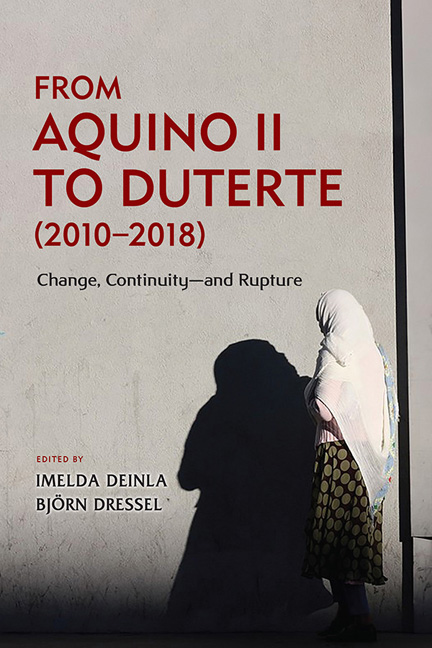Book contents
- Frontmatter
- Contents
- List of Tables
- List of Figures
- Acknowledgements
- Acronyms and Glossary
- Contributors
- Introduction: From Aquino II to Duterte (2010–2018): Change, Continuity—and Rupture 1
- PART I POLITICS AND GOVERNANCE
- 1 The Rise of Illiberal Democracy in the Philippines: Duterte's Early Presidency
- 2 Finding Federalism in the Philippines: Federalism—“The Centerpiece of My Campaign”
- 3 On Crooked Ways and Straight Paths: Assessing Anticorruption Governance of the Arroyo and Aquino Governments
- PART II ECONOMIC GOVERNANCE
- PART III PEACE PROCESS IN MINDANAO
- PART IV INTERNATIONAL ENVIRONMENT
- Index
1 - The Rise of Illiberal Democracy in the Philippines: Duterte's Early Presidency
from PART I - POLITICS AND GOVERNANCE
Published online by Cambridge University Press: 31 January 2020
- Frontmatter
- Contents
- List of Tables
- List of Figures
- Acknowledgements
- Acronyms and Glossary
- Contributors
- Introduction: From Aquino II to Duterte (2010–2018): Change, Continuity—and Rupture 1
- PART I POLITICS AND GOVERNANCE
- 1 The Rise of Illiberal Democracy in the Philippines: Duterte's Early Presidency
- 2 Finding Federalism in the Philippines: Federalism—“The Centerpiece of My Campaign”
- 3 On Crooked Ways and Straight Paths: Assessing Anticorruption Governance of the Arroyo and Aquino Governments
- PART II ECONOMIC GOVERNANCE
- PART III PEACE PROCESS IN MINDANAO
- PART IV INTERNATIONAL ENVIRONMENT
- Index
Summary
INTRODUCTION
Hungarian Prime Minister Viktor Orban, a right populist, espouses what he calls “illiberal democracy”. Orban has weakened media independence, clamped down on the judiciary, intimidated non-government organizations (NGOs) and shown open preference for ethnic Hungarians while targetting minority groups and migrants. He is creating a Hungarian version of the regimes of Vladimir Putin of Russia and Recep Tayyip Erdog?an of Turkey. Orban has rejected criticism from the European Union that he has weakened civil liberties and eliminated most constitutional checks on his executive authority, claiming he is only acting in the interests of his people who gave his party a super-majority in the legislature.
This chapter attempts to apply the concept of “illiberal democracy” to the Philippines under the presidency of Rodrigo R. Duterte. If illiberal democracy can be understood as having a legitimately elected leader who has not (yet) formally curbed freedom of speech or limited powers of branches of government—yet whose rule is marked by systematic violations of civil liberties—then this term arguably applies to the Duterte administration in the Philippines more so than Orban's rule in Hungary. The latter regime has become a “Potemkin democracy” since the 2014 (and the recent 2018) elections in which the ruling party enjoyed unfair advantages, leaving it with only a “democratic facade” in what is in fact “quasi ‘one-party rule’ ”. With his super-majority in parliament, Orban had laws passed that target the press, independent government agencies, NGOs, and even the prestigious Central European University (CEU)—the most recent subject of Orban's ire threatened with closure through socalled “lex CEU” legislation. By contrast, although Duterte has cowed the courts, won control of Congress, and had his chief opponent Leila de Lima jailed on dubious charges—while putting another leading critic, Vice President Maria Leonor “Leni” Robredo under significant pressure—he has not manipulated elections. upheld most democratic rules. The press is not formally censored (although several news outlets have been subject to presidential intimidation) and Congress and the courts have not been subject to legal restrictions (but the Supreme Court Chief Justice and a Duterte critic was removed in an irregular fashion).
- Type
- Chapter
- Information
- From Aquino II to Duterte (2010–2018)Change, Continuity—and Rupture, pp. 39 - 61Publisher: ISEAS–Yusof Ishak InstitutePrint publication year: 2019



